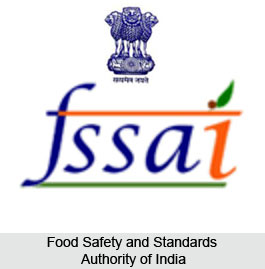 The Food Safety and Standards Authority of India (FSSAI) has been established under Food Safety and Standards Act, 2006 which consolidates various acts and orders that have hitherto handled food related issues in various Ministries and Departments. FSSAI has been created for laying down science based standards for articles of food and to regulate their manufacture, storage, distribution, sale and import to ensure availability of safe and wholesome food for human consumption.
The Food Safety and Standards Authority of India (FSSAI) has been established under Food Safety and Standards Act, 2006 which consolidates various acts and orders that have hitherto handled food related issues in various Ministries and Departments. FSSAI has been created for laying down science based standards for articles of food and to regulate their manufacture, storage, distribution, sale and import to ensure availability of safe and wholesome food for human consumption.
Among the various acts which form part of the Food and Safety Act of 2006 are the Prevention of Food Adulteration Act, 1954 , Fruit Products Order , 1955, Meat Food Products Order , 1973 etc. The Act also aims to establish a single reference point for all matters relating to food safety and standards, by moving from multi-level, multi- departmental control to a single line of command. To this effect, the Act establishes an independent statutory Authority - the Food Safety and Standards Authority of India with head office at Delhi. Food Safety and Standards Authority of India (FSSAI) and the State Food Safety Authorities shall enforce various provisions of the Act.
Ministry of Health & Family Welfare, Government of India is the Administrative Ministry for the implementation of FSSAI. The Chairperson and Chief Executive Officer of Food Safety and Standards Authority of India (FSSAI) have been appointed by Government of India. The Chairperson is in the rank of Secretary to Government of India.
Functions of FSSAI
FSSAI has been mandated by the FSS Act, 2006 for performing the following functions:
Framing of Regulations to lay down the Standards and guidelines in relation to articles of food and specifying appropriate system of enforcing various standards thus notified;
Laying down mechanisms and guidelines for accreditation of certification bodies engaged in certification of food safety management system for food businesses;
Laying down procedure and guidelines for accreditation of laboratories and notification of the accredited laboratories;
To provide scientific advice and technical support to Central Government and State Governments in the matters of framing the policy and rules in areas which have a direct or indirect bearing of food safety and nutrition.
Collect and collate data regarding food consumption, incidence and prevalence of biological risk, contaminants in food, residues of various, contaminants in foods products, identification of emerging risks and introduction of rapid alert system;
Creates an information network across the country so that the public, consumers and panchayats receive rapid, reliable and objective information about food safety and issues of concern.
Provide training programmes for persons who are involved or intend to get involved in food businesses.
Contributes to the development of international technical standards for food, sanitary and phyto-sanitary standards.
Promote general awareness about food safety and food standards.




















